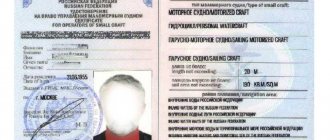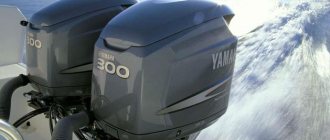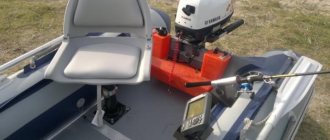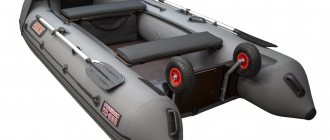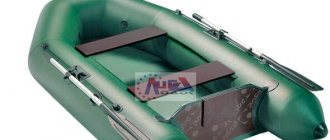What is a small boat?
The latest changes to the Federal Law on Vessel Registration were made in 2012. The law sets out the definition of a small vessel, which is a fundamental term for all owners of yachts or jet skis.
Attention! A small boat is a vessel no more than 20 m long, with up to 12 people on board.
Small vessels are considered:
- catamarans;
- boats;
- jet skis;
- kayaks;
- motor, rowing boats;
- yachts.
What to do if you decide to buy your dream in order to plow rivers and seas:
1. Before buying your own watercraft, you need to think about how many people or cargo you will transport on it. This means whether the product will be large and whether it needs an engine. And if necessary, then how powerful. The need for registration depends on this.
2. After purchasing a boat that is subject to registration, the owner must contact the State Inspectorate for Small Vessels (GIMS), which is part of the Russian Ministry of Emergency Situations. They will help you classify the vessel, undergo inspection and the registration procedure.
As a result, the lucky owner of a yacht or kayak will be given a ship's ticket. The boatmaster must then affix the number shown on the ticket in a visible place on the outside or inside of the vessel. By the way, according to the law, registration takes a maximum of 3 days.
All motor small vessels are subject to mandatory registration with the State Inspection Service
Which inflatable boats are subject to registration in GIMS 2021
Owners of inflatable PVC boats are worried whether they need to contact the state inspectorate and pay transport tax. After all, a small inflatable or rowing boat on the water seems like such an insignificant means of transportation.
Vessels that do not need to be registered with the State Inspectorate:
- boats purchased for the purpose of traveling in inland waters (rivers and lakes) of the Russian Federation;
- a watercraft with a power plant power of up to 8 kW or 9.9 l/s;
- rowing boats.
a watercraft without a power plant and a cargo capacity of up to 200 kg inclusive;
For fishing, hunting and various utility work, an inflatable rubber boat is simply necessary. The law of the Russian Federation obliges the registration of catamarans, jet skis, yachts, boats and various inflatable boats that fall under the regulations of the State Inspectorate for Medical Information.
A rubber boat must be registered if:
- weight more than 200 kg;
- the installed engine has a power of more than 8 kW or 9.9 l/s;
- The boat's registration certificate allows the installation of a motor with a parameter exceeding 10 l/s.
All rubber boats that do not fall within these parameters do not need to be registered with the State Property Management System. But the rules for using rubber boats should not be violated. On the water, an employee of the Ministry of Emergency Situations of the Russian Federation may demand from the shipowner a document authorizing the right to operate the boat.
When going out on the water, the owner of rubber boats must have:
- Russian passport or a copy thereof;
- document of ownership of the vessel;
- driving license (for boats with engine power above 5 hp/3.58 kW);
- oars;
- life vest;
- scoop.
In order to register any boat that meets the parameters of the requirements with the State Inspectorate of Small Boats, namely to obtain a Ship's Ticket for a small boat, you must:
- Buy a boat.
- Collect the required list of documents.
- Come to GIMS, located at the place of registration.
- Provide the required list of documents.
- Get a Ship's Ticket.
IMPORTANT! You can register a boat with GIMS without leaving your home through the State Services portal.
The documents are in order, the ID is in my pocket and the ship's ticket has been received. There is one more important step left to confidently and freely disperse the waves on the territory of the Russian Federation - this is to put a number on the boat in accordance with the rules of GOST and GIMS.
A correctly applied number must have the following characteristics:
- comply with recommended sizes;
- have a contrasting color with the boat;
- be between the bow and a quarter of the length of the ship's stem.
Do you need a license for a boat with a motor when the sailing area is a local pond or a small river in the countryside?
New sample gims certificate
GIMS employees do not care for what purpose a person purchased a watercraft: fishing, hunting or decorating a coastal pier. A boat, a yacht, a catamaran, a boat, a bath basin or a bathtub - everything that fits the GIMS parameters must comply with the established rules.
Important! A license for a vessel with a power of less than 5 horsepower is not required!
A license is required for water transport with the following parameters:
- A motor vessel with a power plant with a power of 5 horsepower or 3.58 kW.
- A boat is a motorized watercraft with a stationary engine.
- A motor boat is a motorized watercraft with an outboard motor(s).
- A jet ski is a frameless water model with a mechanical power plant.
- Sailing vessel.
The fine for driving a boat without a license in 2021 - 2021 ranges from 500 to 1000 rubles
Abbreviation of navigation areas printed on the certificate
- GIMS in Novokuibyshevsk
- Instructions for applying the GIMS number (film) to the boat.
- Instructions for applying the GIMS number (stencil) to a PVC boat.
- 5 options for applying GIMS numbers to a PVC boat
- What color should the GIMS number on the boat be?
- What materials are used to make GIMS numbers?
- Registration of a small vessel in the GIMS of the Ministry of Emergency Situations
- Which small vessels are not subject to registration in GIMS
- Small vessels subject to registration with GIMS
- Where can I order numbers for a boat?
- GIMS fines for small vessels, current for 2020-2021, taking into account the latest changes
- Production of a GIMS number for a boat
- Number plates for a new type boat
- Numbers for jet ski
- Number on PVC boat
Let's look at the definitions.
SUP (stand up paddleboard)
- Standing rowing board with an oar in hand. Driven by human muscle power. The maximum length is 7 meters, the maximum number of people is 12.
Small boat
(according to the legislation of the Russian Federation) is a vessel whose length should not exceed 20 meters and the total number of people on which should not exceed twelve.
It turns out that all SUP boards, kayaks, sailboats, sailing boats, catamarans, inflatable fishing boats no longer than 20 meters and without motors are small vessels that are not subject to registration.
- A small vessel with an engine power of more than 5 horsepower is subject to mandatory registration, and the shipowner must undergo certification for the right to navigate.
- From July 1, 2021, owners of rentals of small boats will have to declare compliance with the requirements for the condition of their fleet.
- Owners of rental cars must undergo technical inspection of small vehicles at least once every 5 years. Possibly more often. The inspection is carried out by the Russian Ministry of Emergency Situations and this inspection is an official government service.
- When ships move up to 4 meters, each person on board must have ISS*.
- When passing through the lock, when moving on water, when moving in the port waters and while on the open deck, all passengers must wear ISS.
- Children under 12 years of age, while in motion and on the open deck, must wear a life jacket at all times.
- Preschoolers on the open deck must always wear a safety harness and only be accompanied by an adult.
- Fishermen must wear a life jacket at all times.
Last year, many media outlets mentioned that the Ministry of Emergency Situations was working on a new project. It was assumed that not only the concept of “Small Vessel” would be changed, but also the requirements for them. However, more than one year has passed and no new law has yet appeared. Development is still ongoing, and the rules will most likely come into force in 2021. It's time to remember all the innovations that were introduced no more than two years ago, because they remain valid.
from the 2021 edition Other changes have been made, but first things first:
- Registration. Previously, it was possible to register a small vessel only at the place of registration of the owner. Now it is permissible to register a boat at the owner’s address in any GIMS .
- Number plates. Until 2021, the number consisted of 7 characters. Since 2017, it contains 11 characters: two letters, 4 numbers, the inscription RUS and the region. As before, it is applied in one line on both sides.
- Flag of Russia . Several years ago, the image of the Russian flag next to the number was the desire of the boatmaster, but now it is an obligation.
- Deadlines. Until 2021, the period for providing public services was three working days, during which one could either register or be refused. Today, the period from the moment of submitting the application to receiving the result is also three days, but if reasons for refusal are identified, it can be extended to 30 working days.
- Reasons for refusal of registration. Several points have been added to the rules that were in force until 2021. Registration of a transport vehicle may be refused if the factory markings are missing (or changed) or the applicant does not appear at the GIMS within one month. In addition, registration of boats that are listed as missing will be denied.
Federal Law of the Russian Federation No. 23 “On Amendments to Certain Legislative Acts of the Russian Federation Regarding the Definitions of Small Vessels” has remained virtually unchanged since its publication (04/23/2012). However, now a small vessel can be:
- small - boats up to 20 meters long and weighing less than 200 kg (with equipment), capable of carrying no more than 12 passengers;
- pleasure boats - vessels accommodating up to 18 people (out of no more than 12 passengers), used for non-commercial purposes;
- sports sailing - yachts designed for sports.
According to the Federal Law on Registration of Small Boats the watercraft , for example, lifeboats, are not subject to registration In addition, boats weighing up to 200 kg and a motor of less than 8 kilowatts are not required to be registered. Sports kayaks, catamarans, inflatable boats - all this does not have to be registered with the inspection.
water registration services . For example, for an order to register vessels you have to pay 2 thousand rubles, and for sailing or pleasure vessels - 1 thousand. If changes need to be made, the cost is reduced several times. Obtaining a certificate of ownership now costs 500 rubles, and a ship ticket - 100.
This category includes boats, yachts and other watercraft that are up to 20 meters long and can accommodate no more than 12 passengers. Following the new rules for driving small boats introduced in 2021, all boats that meet the following characteristics must be registered with the inspection:
- the boat has a motor with a power of more than 10.8 horsepower (or 8 kilowatts);
- The boat has a mass of over 200 kg.
It is worth remembering that the second point does not take into account the weight of the vehicle according to the technical passport, but the weight with all the equipment. The weight of the boat and motor, a full fuel tank and even all the equipment on board are taken into account. It is advisable to study GOST R ISO-8666-2012 on the official websites in order to correctly calculate the permissible weight. As of March 20, 2019, an amendment to the law is in effect - the weight of the heaviest motor recommended for a certain model of a small boat is taken into account.
Based on the orders of the Ministry of Emergency Situations No. 339 and No. 340, it is possible to register a small boat at the place of residence of the boat owner. For this, the following documents are prepared:
- Russian passport;
- purchase and sale agreement confirming ownership (or other document);
- registration certificate of the boat and motor;
- receipt of payment of state duty.
The process of registration begins from the moment a citizen applies to the State Inspectorate for Information Services, and the request is recorded. The owner fills out an application to register the vessel and submits documents for verification, from which copies are made - the original is immediately returned. Next, the skipper is assigned a request number and told what to do next. Before transferring the papers to a specialist, you must pay a state fee of 200 rubles.
MS registration rules
As experts say, the latest legislative act “loosened the screws” a little, and after its adoption the list of medical conditions not subject to mandatory registration has expanded noticeably.
No need to register:
- any non-motorized watercraft weighing up to 200 kg (inclusive);
- motor products up to 200 kg with engine power up to 8 kW, i.e. up to 10.88 hp (inclusive).
Attention! The weight of the boat and the power of the motor are determined by the documents (passport) of the boat.
The material from which the swimming device is made does not matter. The main thing is to comply with the weight requirements. This means that the following weights up to 200 kg are not subject to registration:
- inflatable transom boats;
- inflatable, "Tourist" type;
- plastic;
- metal;
- wooden;
- collapsible composite;
- boats with electric motors of the specified power;
- various kayaks;
- rowing and sailing catamarans.
Advice. If your boat or boat does not need to be registered, then when fishing you should take a photocopy of documents for the vessel and the motor, as well as a photocopy of your own passport. If the ship is registered, then you need to carry the ship's ticket or its certified copy with you.
All other vehicles weighing more than 200 kg, or equipped with a motor over 8 kW, must be registered with the GIMS service. The owner of the watercraft must regularly carry out technical inspections and pay the appropriate taxes. Violation of the rules results in a fine.
New GIMS rules for small vessels 2020 - legal framework
In the spring of 2021, information appeared in the media that specialists from the Russian Ministry of Emergency Situations were developing a new draft Federal Law “On the safety of navigation of small vessels and on amendments to certain legislative acts of the Russian Federation.” In particular, a number of concepts about the navigation of small vessels and their legal status will be changed. It is also planned to adjust the criteria for determining small vessels that are not subject to mandatory registration in the State Property Management System, because The current regulations are interpreted ambiguously.
However, since then, there have been no official statements from officials about changes in the rules of navigation on small vessels in Russian territorial waters in 2021. This means that the development of the project is still ongoing and no important amendments to the current legislation are expected for next year. However, it would not be a bad idea to refresh your memory of the rules for driving small boats, which, by the way, were changed in the Russian Federation just a year ago, on the eve of 2021. After all, most likely, the adopted rules of navigation for small vessels will continue to operate in the same edition throughout 2021.
Registration of small vessels according to the rules of GIMS 2020
So, first, let’s understand the legal concept of the term “small vessels”. According to current legislation, a small vessel is a vessel that can accommodate up to 12 people on board with a hull length of no more than 20 meters.
According to the standards that introduced the rules for the water traffic of small vessels in 2021, vessels that meet the following parameters are subject to mandatory registration with the state inspection.
- Small boats used with motors with a power of more than 8 kW (up to 10.8 hp) must be registered.
- Vessels whose gross weight exceeds the norm of 200 kg are subject to registration.
And if on the first point everything is extremely clear, then on the second point questions and discrepancies arise. For example, what is considered the total and maximum permitted weight of a boat? Some inspections make calculations according to the following scheme:
- weight of this boat + weight of the installed motor + transported equipment + filled fuel tank
Thus, most small and medium-sized boats fit into the 200 kg standard. But, the central office of GIMS recommends measuring the mass of the boat and motor based on the requirements of GOST R ISO-8666-2012. According to this document, the weight of a motor vessel is taken to be the weight of the boat not with the actual engine installed, but with the engine with the maximum possible technical parameters. So, for example, if you are using a boat with a motor power of 5 hp. and weighing 27 kg, and the vessel’s passport indicates an engine of up to 10 hp, then the inspection will take into account the weight of the heaviest engine of 10 hp!
Of course, this state of affairs causes a lot of controversy and disagreement, so the registration procedure in the new draft rules for operating small vessels 2021 must be adjusted. But what these changes will be and from what year they will take effect is still unknown.
By the way, we note that according to the new rules, a boat can be registered at any branch of the State Inspectorate for the Inspection of Water, and not necessarily at the one where the vessel was registered previously. In this case, the applicant will be provided with the result of processing the service (registration documents/justified refusal/decision to suspend the execution of documents) within no more than 3 working days.
Boatmaster's responsibilities
The rules for river navigation of small vessels regulate the legal and necessary actions of the steering craft. Here, unlike the previous point, everything is extremely simple, clear and without changes. Based on the rules for navigation of small vessels 2018-2020, navigators are obliged to:
- Know and comply with the requirements of state laws and shipping regulations.
- Before each trip to the water, check the technical condition of the vessel.
- When transporting passengers, ensure their safety and provide mandatory instructions.
- Ensure the availability of all necessary documents for the vessel (driving license, registration certificate, vehicle passport, etc.).
- Comply with the requirements of authorized representatives of supervisory authorities.
Let us note that failure to comply with the requirements established by state legislative acts and rules entails the imposition of an administrative fine on officials and strict sanctions, including those involving the deprivation of navigational rights.
You may be interested: Aluminum boats from Russian manufacturers: advantages, popular models, prices
Small vessel hull number
In 2021, the rules for operating small vessels have undergone important changes in the section on applying side markings. Previously, the registration number applied to the boat consisted of 7 characters (3 letters + 4 numbers), and at the owner’s request, the Russian flag could be applied next to it. Now, according to the new GOST, the application of the state flag and 11-digit number is mandatory for inland water transport of the Russian Federation.
The ship's side number is assigned during the registration of small vessels supervised by the GIMS of the Ministry of Emergency Situations. According to the new rules, it consists of the following elements:
- 2 letters;
- 4 digits;
- Digital designation of the Russian region;
- The letter indication of the country (RUS) and the image of the flag.
At the same time, requirements are put forward for the correct design of the inscription.
The identification number is applied to each side of the boat in one line and in such a way that its geometric middle is at a distance from the stem at a distance of no less than ¼ of the overall length of the vessel. In this case, the height of the letters must be at least 15 cm, the width is 10 cm, and the thickness of the outline is allowed within 1.5-2 cm.
In cases where the design of the vessel does not allow the above requirements to be met when applying the side number, the procedure for placing the number is regulated by the registration authority. Moreover, this feature is noted in the GIMS register and in the ship’s water transport ticket.
Malfunctions prohibiting the use of small-sized vehicles
The rules for driving small boats on rivers, lakes and other bodies of water also provide for a technical examination of vehicles. Thus, according to the requirements of the new regulations of the rules for driving small vessels in 2021, the use of water transport that has one or more of the following malfunctions is prohibited.
- Through holes in the hull.
- Depressurization of compartments and (or) air boxes, as well as their absence.
- Damage to the components of the steering device, lack of structural parts, unreliable fastenings and other malfunctions that destabilize the reliable operation of the steering wheel.
- Absence or breakdown of a muffler, strong vibration of the body, detection of fuel leaks.
- Damage to the engine control system, faulty engine start blocking when reverse is on, unstable on/off of the reverse gearbox.
- Absence, breakdown or improper operation of signal lights.
- Inconsistency of the boat configuration and installed equipment with the standards specified in the ship's ticket.
Thus, putting a vessel on the water in circumvention of established prohibitions entails the imposition of an administrative fine on officials, i.e. on the navigator and the owner of the vessel.
Documents for registration
Before going to the GIMS department, you need to collect a package of documents according to the following list:
- statement;
- passport;
- TIN;
- documents confirming ownership of the MS and engine;
- technical passport for the watercraft;
- technical passport for the motor (if any);
- a receipt confirming payment of the state duty (the amount of duty in 2021 is 1100 rubles)
During the procedure, it is necessary to show the vessel so that the civil servant can make sure that it corresponds to the documents.
Vessel inspection must be carried out every 5 years
Procedure for technical inspection
If previously maintenance was annual, then from June 2, 2013 the rules changed. A registered vessel must now be inspected in the following cases:
- mandatory - 1 time every 5 years. Moreover, the maintenance date is counted from the registration date indicated in your ship’s ticket;
- before registering swimming equipment built independently, or those that have not been certified at the factory;
- technical inspection before moving the vessel to another region;
- inspection after eliminating faults identified during a previous inspection or after repair.
Attention! The fine for lack of technical inspection is 500-1000 rubles. For lack of rights – from 1,000 to 1,500 rubles.
The inspector is obliged to inspect the sailing vessel both afloat and on land in order to assess not only its technical condition and equipment, but also its seaworthiness.
What kind of boat do you need a license for?
The right to operate a boat, boat, jet ski or yacht is officially called a Certificate for the right to operate a small craft. The certificate must be obtained by owners of motorized watercraft with a motor power greater than 5 hp. Those. To operate any rowing MS, even bulky and heavy ones, you do not need a license.
Attention! In order to obtain a Certificate giving the right to operate a small motorized vessel, you need to learn 20 tickets. To drive a jet ski – 10 tickets.
To obtain rights, you must contact any GIMS branch. Moreover, you can prepare for the exam yourself at home and pass it as an external student. Or go to classes and take an exam after completing the courses taken. The process of testing knowledge is similar to obtaining a license to drive a car. The procedure is divided into 2 stages: theory and practice. Boat handling practice includes the ability to move forward and backward, make a snake, and lift aboard a drowning person (dummy).
Compliance with the standards in the field of small boats will help you safely travel through the most beautiful, vast expanses of water.
Do I need to bring documents with me for an unregistered boat?
There is no such explicit and direct, legally enshrined requirement. However, there are sometimes situations when documents confirming ownership of a boat that is not subject to registration, as well as an identity document for the boatmaster, are very appropriate.
Here is what can be said briefly about this.
Multiple letters on the essence of the question
So, you have a boat that, by all criteria, is not subject to registration.
What is its legal status? The same as a bicycle, roller skates and skates, or the full status of a small boat? The answer to this question is given in paragraph 3 of Art. 7 of the Merchant Shipping Code of the Russian Federation and Art.
3 of the Code of Inland Water Transport of the Russian Federation: a vessel whose length is not more than 20 meters and whose passenger capacity is not more than 12 people is considered small.
Thus, the legislator does not make any special distinctions in the legal status of boats subject to registration and “non-registered”. “Silver” with 200 hp, an inflatable with a 5 hp engine, a pedal boat, a pleasure rowing boat and even some two-meter “Dive” with a power plant of no more than 1 manpower with oars in hands - all this small vessels.
As you know, if a small vessel (hereinafter referred to as MS) is not subject to state registration, it does not require a license, ship ticket or numbers. Nevertheless, these vessels remain supervised by GIMS.
When moving around the waters on such a vessel, you are still obliged to ensure the MS supply standards regarding the safety of passengers, know and comply with the Rules of Navigation, etc.
The “alcohol” article, by the way, applies entirely to boatmasters of “non-registrants”.
Well, what about the documents?
I take my ID card out of my wide trousers
If the skipper of an unregistered MS has committed an administrative offense, the GIMS inspector who established this is obliged to draw up a protocol on the administrative offense.
But if this boatmaster does not have a passport with him, then how will he do this? Will he write it from the words of the offender on some Vasya Pupkin? Everything is very simple.
In this case, the inspector is obliged to detain the small vessel, and hand over the boatmaster (believing “that whiskers, paws and tail are my documents”) to the police for the purpose of identification. In this case, the police use detention until identification for a period of up to 3 hours as a security measure (Administrative Code of the Russian Federation, Part 1 of Article 27.5).
From the point of view of the Law, a GIMS official is obliged to do exactly this (see update at the end of the article). Of course, we are all human, “why spoil your vacation,” and “who needs to waste time,” etc. However, we must always remember that neglecting the norms of Chapter 11 of the Code of Administrative Offenses of the Russian Federation at the tiller of an unregistered boat has a chance to end (oddly enough) much worse than on an “adult” boat.
Thus, it is highly desirable for the skipper of a small vessel to have an identification document (or a certified copy thereof) with him.
What about the rest of the documents?
Documents confirming ownership of a small vessel
Such documents are a purchase and sale agreement, a certificate of invoice, and a sales receipt. If the boat and motor were purchased separately, the listed documents must exist in nature for both. But do you need to take them with you?
First of all, you need to find out on what legal norm responsibility for not having documents for a boat is based.
According to Article 11.8.1. Code of Administrative Offenses of the Russian Federation Operating a small vessel by a navigator who does not have with him the documents necessary for admission to operating a small vessel:
That is, the boat must have a license, a ship's license, and if you are not the owner, who cannot be observed on board at the moment, then also a power of attorney for the right to “own, use or dispose” of the vessel.
Of course, if the boat is not subject to registration, no license is required, and there simply cannot be a boat license. And in general, if we are talking about a boat that is not subject to state registration. registration, what kind of access to management can we talk about? Those. requirements 11.8.1 , it turns out, do not apply to boats that are not subject to registration .
Thus, we come to the conclusion that there is no need to carry documents confirming ownership of a boat that is not subject to registration.
However, some senior GIMS inspectors argue that it is not necessary to carry copies of title documents with you, that this is just a good, friendly recommendation from GIMS.
Others, no less senior, claim exactly the opposite and say that you need to carry certified copies with you.
From time to time, joint raids are carried out by the GIMS and the transport police. Which “hangers” are stolen more often? That's right, low-power. Sometimes along with boats.
Therefore, if you are the owner of an “unregistered” boat, there is some possibility that the make and model of your boat or motor is on their list of stolen ones. You may be stopped to check whether you blew the engine.
And in this case, what is your evidence? (C). Documents only.
In addition, legislation regarding MS is now changing (adding to) quite quickly. Today your boat is not registered, but tomorrow it is required to be registered.
Lyrical digression. Now dozens, if not hundreds, of boat models are being produced that are capable of moving normally under PLM up to 10.88 hp, and, at the same time, not all of them are “unregistered”. So is it possible, even for the smartest GIMS employee, to know everything about all the boats? But there is also “samostroy”.
How will a GIMS inspector determine on the water whether a given boat is subject to registration or not without a boat passport? The engine speaks for itself, but how can a Gimsovite draw a conclusion about the mass of a boat model unfamiliar to him? Will he weigh it with his hand on the shore? Don’t think that I’m also campaigning for a boat passport.
Simply, returning to the topic of state registration of the MS, there is another reason to think about whether it is correct to focus on the weight of the vessel?
conclusions
For the boat operator of a boat that is not subject to mandatory state registration, it may be very useful to carry an identification document (or a certified copy thereof).
The legislation does not have a clearly formulated requirement for such a boatmaster to have with him documents confirming the legality of ownership and disposal of the small vessel he controls, as well as an identity document. However, GIMS (to avoid nervousness during communication) recommends having such documents with you.
Yes, I agree - going to the State Inspectorate for Medical Information and certifying copies of the DCP and other necessary documents is a waste of time, especially considering that this is a voluntary matter. This is only for “every fireman”. I don’t know what the “density” of inspections by supervisory authorities is in your water area.
Therefore, whether it makes sense to reinsure yourself in this way or not is up to you to decide.
Note to “BUT” or militant anonymous people (05/15/2017)
GIMS has answers to all questions - just ask. And the question was asked about how the GIMS inspector will draw up a protocol (or resolution) for a person who does not have documents with him by which his identity could be established? And here's the answer:
Police Law? But what does GIMS have to do with it? We look at paragraph 3 of Art. 10 of the Law “On Police”:
Those. GIMS, as a state body, has the right to contact the police in order to ensure that it [GIMS] carries out its activities. Who needs to spend time delivering the unfortunate anonymous person to the duty station is another question, but as you can see, there are grounds for this (if he commits an administrative offense).
Source: https://ruslodka.ru/gims/registratsiya-lodok-i-katerov/985.html
